典范英语成为“领头羊”
典范英语6-16故事梗概200词
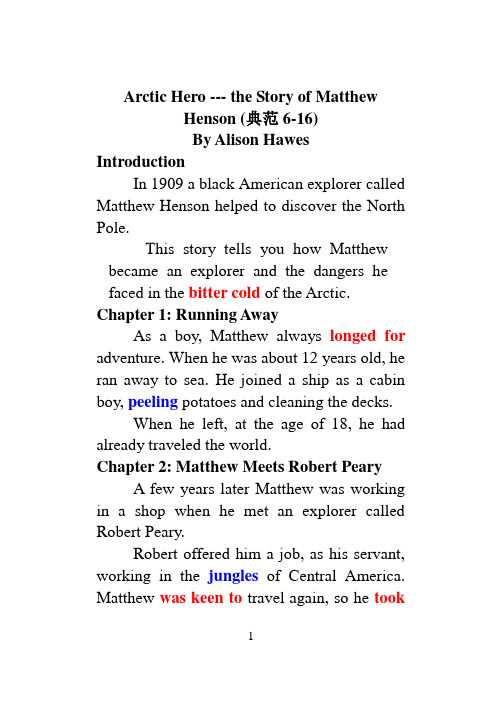
Arctic Hero --- the Story of MatthewHenson (典范6-16)By Alison Hawes IntroductionIn 1909 a black American explorer called Matthew Henson helped to discover the North Pole.This story tells you how Matthew became an explorer and the dangers he faced in the bitter cold of the Arctic. Chapter 1: Running AwayAs a boy, Matthew always longed for adventure. When he was about 12 years old, he ran away to sea. He joined a ship as a cabin boy, peeling potatoes and cleaning the decks.When he left, at the age of 18, he had already traveled the world.Chapter 2: Matthew Meets Robert PearyA few years later Matthew was working in a shop when he met an explorer called Robert Peary.Robert offered him a job, as his servant, working in the jungles of Central America. Matthew was keen to travel again, so he took1the job.While they were in the jungle, one of Robert’s survey team fell into some quicksand. The man was so frightened, he left the expedition.Matthew asked if he could take over the man’s job, and he never worked as a servant again. After working in the sticky heat of the jungle, Robert’s next trip was to the bitter cold of the Arctic. He asked Matthew to come with him as a member of his team.He and Matthew then spent the next 18 years exploring the Arctic together.Chapter 3: Matthew in GreenlandThey began by making several trips to Greenland, where the Inuit people (因纽特人,过去称为爱斯基摩人,居住在北美北部严寒地区) helped them to learn the skills they needed to survive in the Arctic.Matthew quickly learned to speak Inuit and became good friends with the people. They called him “Matthew-the-kind-one”(好人马修).They learned how to fish for charr(嘉2鱼)and hunt for seals. They learned to build igloos(雪屋)and make clothes and boots from animal skins. They also learned to build sledges(雪橇)and drive teams of husky dogs. In fact, Matthew soon became an expert(专家)sledge driver.Matthew and Robert traveled across the unexplored ice fields in the north of Greenland. They made maps and helped to show that Greenland is an island. They also found three enormous(巨大的)meteorites(陨石).But even with help from the Inuit, the Arctic was a dangerous place for Robert and Matthew to be(生存). Once they were out hunting when a musk ox suddenly charged at (向…冲去)Robert. Just in time, Matthew saved Robert’s life. He shot the ox with his last bullet.Another time they were hundreds of miles from camp when they ran out of food. They were cold and weak, and a man traveling with them was dangerously ill. In the end they had to eat their dogs or(否则)starve to death.3Chapter 4: To the North PoleDespite(尽管=in spite of)the dangers, Robert and Matthew bravely went back to the Arctic again. This time they wanted to do something no one had ever done before. They wanted to try to reach the North Pole. But on their first attempt Robert’s feet became badly frostbitten(严重冻伤).Robert was in such pain that he couldn’t walk or even stand. As soon as they could travel, Matthew strapped(捆绑)Robert to a sledge and rushed 250 miles to base camp(大本营), where there was a doctor. The doctor had to take off eight of Robert’s toes.But still Robert and Matthew would not give up. Three more times they tried to reach the Pole. Each time they got closer than before. But each time they were beaten back by blizzards(暴雪)or melting ice.Chapter 5: One Last ChanceIn 1908 Robert and Matthew sailed from New York to make their fifth attempt to reach the Pole. But they agreed(达成共识), because of their age, that they would make this4their last trip to the Arctic. This would be their last chance to reach the North Pole!On their way north, they stopped in Greenland to buy the huskies, furs and equipment(设备)that they needed. They also visited several villages to hire Inuit men and women to come with them and help them on their last journey.As their ship sailed further north, the sea began to freeze over. At first the ship was able to cut through the ice, but as the ice got thicker they sometimes had to use dynamite(炸药)to help them break through.In the end the sea ice was just too thick and they could go no further. So they set up their base camp on an island off the coast of Canada(靠近加拿大海岸线的). They spent the winter getting ready for their last attempt to reach the Pole.In the spring they were ready to set out. Robert put the men into teams and they began setting up a line of camps across the sea ice. At each camp they left food, equipment and igloos for Robert and Matthew to use on their5way back from the Pole.But this was not easy. Time and time again they were held up by the ice and the bad weather. At times the ice was so jagged it broke their sledges. Other times it was so high that they had to drag their heavy sledges over it by hand.The ice creaked and moaned and cracked open without warning.Once Robert was going to sleep when he heard a noise. Looking outside, he saw a crack open up around one of the other igloos! He and Matthew shouted to the men who just had time to leap to safety(差点来不及跳到安全的地方).When they were 130 miles from the Pole, they set up their last camp. Robert sent the last support team back to base camp, as they were no longer needed.Then, with Matthew and four Inuit men, he set off on the last leg of their journey to (踏上他们去往…的最后一段路程)the Pole itself. For once the ice was smooth and the weather good, and for the next few days the6six men made good speed. But, just a few miles from(就在离…几英里的地方)the Pole, Matthew suddenly fell through the ice. Luckily one of the men was close by and pulled him out before he drowned. Later that day the six men reached the Pole. It was 6th April 1909.After years of hard work, disappointments and danger, Robert and Matthew had done it(成功了)at last. They were the first people ever to stand at the North Pole!Chapter 6: Back HomeMatthew and Robert arrived back in New York months later, expecting to be treated as heroes. But this was not to be. While they were away, a man called Frederick Cook had claimed to have reached the North Pole before them!In the end, Cook’s claim was shown to be a hoax. Robert, being the leader of the expedition, was rewarded with the fame and medals he deserved(配得到,应得的).But sadly in America at that time, black people were given little respect. So, at first,7Matthew was not rewarded for his part(发挥的作用)in the expedition.Chapter 7: Rewarded at LastIt wasn’t until(直到…才)he was an old man that Matthew was given any rewards for his part in reaching the North Pole. And even now, years after his death, the world is still only just learning about this great explorer. In 2000 the greatest medal an explorer could ever wish for--- the Hubbard medal --- was awarded to Matthew’s niece on Matthew’s behalf.Matthew Henson --- the man who helped to discover the North Pole --- would now be remembered by people all over the world! More information about Matthew Henson In 1998 a film called Glory and Honor (《光荣与荣誉》,中文译名又为《极地悍将》)was made, claiming to be the true story of the search for the North Pole.Then, in 2001, a radio programme called Stealing the Glory was produced.You can find more information about Matthew Henson on these websites:8/henson.htmthe ________ cold 严寒long ________ 渴望be keen to do______________________ the job 接受这个工作take over the job______________________ trips to Greenland 去格林兰旅行hunt ________ 捕猎make clothes and boots ________animal skins 用动物皮制作衣服和靴子________ maps 绘制地图________ out of food 用完,耗尽starve to death_____________on their first attempt 在他们第一次_____________时________ their fifth attempt 进行第五9次尝试break through_____________set ________ 出发___________________ 一次又一次hold up_____________________ times…other times 有时候…还有时候________ warning 没有预兆,警告wish _________ 梦寐以求search _________ =hunt for 寻找10。
典范英语介绍
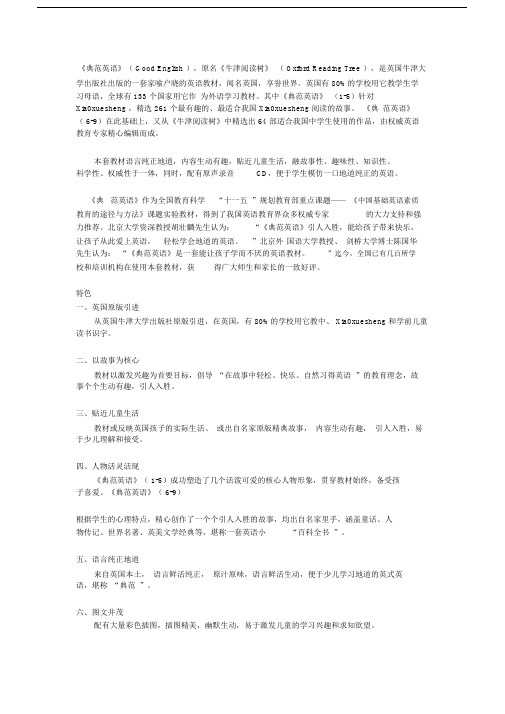
《典范英语》( Good English ),原名《牛津阅读树》( Oxford Reading Tree ),是英国牛津大学出版社出版的一套家喻户晓的英语教材,闻名英国,享誉世界。
英国有 80%的学校用它教学生学习母语,全球有 133 个国家用它作为外语学习教材。
其中《典范英语》(1-5)针对Xia0xuesheng ,精选 261 个最有趣的、最适合我国 Xia0xuesheng 阅读的故事。
《典范英语》( 6-9)在此基础上,又从《牛津阅读树》中精选出 64 部适合我国中学生使用的作品,由权威英语教育专家精心编辑而成。
本套教材语言纯正地道,内容生动有趣,贴近儿童生活,融故事性、趣味性、知识性、科学性、权威性于一体,同时,配有原声录音CD,便于学生模仿一口地道纯正的英语。
《典范英语》作为全国教育科学“十一五”规划教育部重点课题——《中国基础英语素质教育的途径与方法》课题实验教材,得到了我国英语教育界众多权威专家的大力支持和强力推荐。
北京大学资深教授胡壮麟先生认为:“《典范英语》引人入胜,能给孩子带来快乐,让孩子从此爱上英语,轻松学会地道的英语。
”北京外国语大学教授、剑桥大学博士陈国华先生认为:“《典范英语》是一套能让孩子学而不厌的英语教材。
”迄今,全国已有几百所学校和培训机构在使用本套教材,获得广大师生和家长的一致好评。
特色一、英国原版引进从英国牛津大学出版社原版引进,在英国,有 80%的学校用它教中、 Xia0xuesheng 和学前儿童读书识字。
二、以故事为核心教材以激发兴趣为首要目标,倡导“在故事中轻松、快乐、自然习得英语”的教育理念,故事个个生动有趣,引人入胜。
三、贴近儿童生活教材或反映英国孩子的实际生活、或出自名家原版精典故事,内容生动有趣,引人入胜,易于少儿理解和接受。
四、人物活灵活现《典范英语》( 1-5)成功塑造了几个活泼可爱的核心人物形象,贯穿教材始终,备受孩子喜爱。
《典范英语》( 6-9)根据学生的心理特点,精心创作了一个个引人入胜的故事,均出自名家里手,涵盖童话、人物传记、世界名著、英美文学经典等,堪称一套英语小“百科全书”。
《典范英语》(6b-L7)教学参考
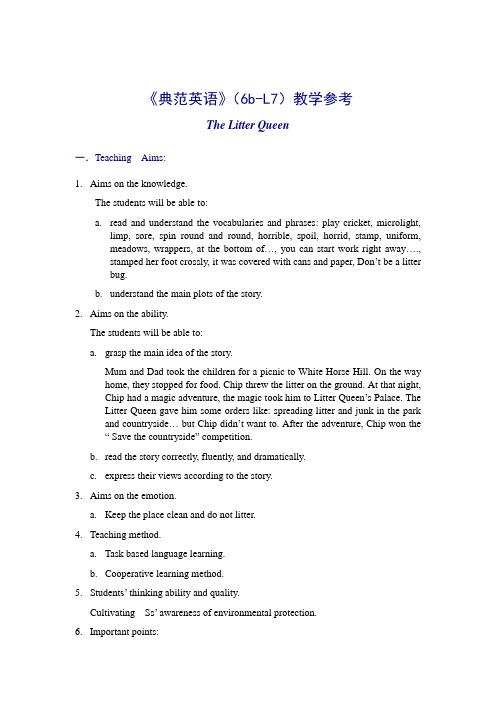
《典范英语》(6b-L7)教学参考The Litter Queen一.Teaching Aims:1.Aims on the knowledge.The students will be able to:a.read and understand the vocabularies and phrases: play cricket, microlight,limp, sore, spin round and round, horrible, spoil, horrid, stamp, uniform,meadows, wrappers, at the bottom of…, you can start work right away….,stamped her foot crossly, it was covered with cans and paper, Don’t be a litterbug.b.understand the main plots of the story.2.Aims on the ability.The students will be able to:a.grasp the main idea of the story.Mum and Dad took the children for a picnic to White Horse Hill. On the way home, they stopped for food. Chip threw the litter on the ground. At that night, Chip had a magic adventure, the magic took him to Litter Queen’s Palace. The Litter Queen gave him some orders like: spreading litter and junk in the park and countryside… but Chip didn’t want to. After the adventure, Chip won the “ Save the countryside” competition.b.read the story correctly, fluently, and dramatically.c.express their views according to the story.3.Aims on the emotion.a.Keep the place clean and do not litter.4.Teaching method.a.Task based language learning.b.Cooperative learning method.5.Student s’ thinking ability and quality.Cultivating Ss’ awareness of environmental protection.6.Important points:The students will be able to:a.read and understand the vocabularies and phrases.b.understand the main plots of the story.c.grasp the main idea of the story.7.Difficult points:The students will be able to:a.read the story correctly, fluently, and dramatically.b.express their views according to the story.二、课堂教学基本步骤1. 导入(Lead-in):Free talk:Why do we call the queen “Litter Queen” ?Do you litter everywhere?Do we have Litter Queen or Litter King in our classroom?What will you do if you see someone littering?之后,自然过渡到讲故事环节:The children went for a picnic. Did they litter? What adventure did the children have? Le t’s learn the story The Litter Queen.2. 看图讲故事(Storytelling):了解故事背景教师利用课件选取播放故事前10幅图片,并用丰富的表情、生动的英文和适当的肢体语言给学生绘声绘色地讲故事,引导学生观察图片,了解故事背景。
光明日报:《牛津阅读树》根植百姓家

光明日报:《牛津阅读树》根植百姓家最近几年,我被外派工作,先后任职于我驻亚洲和地中海地区的使馆,双胞胎女儿也随我辗转了大半个地球。
在国外上幼儿园和小学,英语是她们必过的第一道关。
在两地就读国际学校期间,学校都采用了《牛津阅读树》(Oxford Reading Tree)这套教材。
各国外交官碰到一起,孩子的教育自然成了超越国籍、跨越文化、拉近感情的重要话题。
相互交流后得知,《牛津阅读树》在我所驻的两个国家被采用,可不是什么巧合,各国职业外交人员的孩子们在世界各个国家,大多都使用这套教材。
《牛津阅读树》作为牛津大学出版社出版的英语母语学习材料,在英国家喻户晓,在世界上也备受推崇,从我两个女儿和她们众多各色皮肤同学们的学习经历也可窥见一斑。
今年回国后,在网上发现《牛津阅读树》已经在中国落户安家了。
弘书阁教育引进版权,把该教材命名为《典范英语》(Good English),将几百本连环画故事书辑成5级10册,还配上了录音CD光盘,涵盖整个小学英语教育,每级售价仅一百多元,既原汁原味,又符合国人使用习惯和消费现状,真是功大莫焉。
引进一本好的字典,可以更精准地识文解字;引进一套丛书,可以开拓某一领域的国际视野;引进一部好的文学或影视作品,可以更多地了解世界文化的多元。
无疑,《典范英语》立意更高远,弘书阁更具战略思考。
学习语言,有什么比“从娃娃抓起”更重要、更有效呢?我国英语教学诟病颇多,孩子们和家长们备受煎熬。
《典范英语》对症下药,携国际最先进的教育理念,向中国家长和孩子们提供了一套全球最权威的教材,集故事性、趣味性、知识性和科学性为一身。
小学英语课外阅读读物推荐

小学英语课外阅读读物推荐一:学生读物推荐一:《典范英语》《典范英语》(Good English),原名《牛津阅读树》(Oxford Reading Tree),是英国牛津大学出版社出版的一套家喻户晓的英语教材,闻名英国,享誉世界。
英国有80%的学校用它教学生学习母语,全球有133个国家用它作为外语学习教材。
《典范英语》共分九级,其中(1-5)针对小学生,精选261个最有趣的、最适合我国小学生阅读的故事;(6-9)在此基础上,又从《牛津阅读树》中精选出64部适合我国中学生使用的作品,由权威英语教育专家精心编辑而成。
本套教材语言纯正地道,内容生动有趣,贴近儿童生活,融故事性、趣味性、知识性、科学性、权威性于一体,同时,配有原声录音CD,便于学生模仿一口地道纯正的英语。
网络上较出名的《外研社丽声拼读故事会》就是其中的一部分。
推荐二:《攀登英语阅读系列》《攀登英语阅读系列》包括“关键阅读技能训练” 和“分级阅读”两个部分。
“关键阅读技能训练”部分包括“有趣的字母”和“神奇字母组合”两辑,主要训练孩子将英语字母或字母组合的形和音准确对应的拼读能力。
不管孩子是刚刚开始进行英语学习,还是已经有了一定的英语基础,进行关键阅读技能的训练,都可以帮助孩子达到事半功倍的学习效果。
“分级阅读”共包括六个级别的阅读资源,覆盖了国家《英语课程标准》要求掌握的主要词汇、句式和语法点,能满足不同地域、不同年龄、不同英语水平的孩子的英语阅读需求。
推荐三:《体验英语》在外语教学中,经常要面对这样一个问题:同一年级的学生在语言能力、学习兴趣和要求等方面各不相同,那么,到哪里能找到一套丰富的阅读资源让所有的学生都能获益呢?让爱读书的孩子有更多的收获,尽情享受英语阅读的乐趣,让原来不爱阅读的孩子喜欢上英语阅读,通过读故事、读短剧、读科普文章培养自己的认知能力和阅读能力,养成良好的阅读和学习习惯。
《体验英语少儿阅读文库》提供解决方案,从适合自己的开始!快乐阅读,强调阅读通畅性和趣味性,满足学生的成就感。
典范英语617
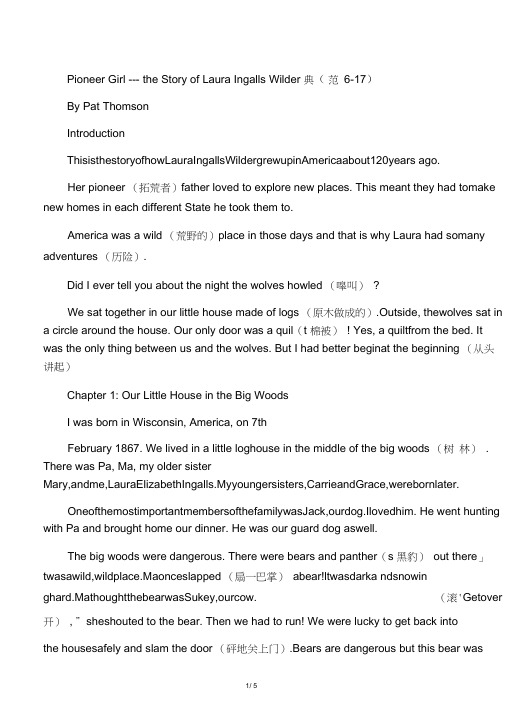
Pioneer Girl --- the Story of Laura Ingalls Wilder 典(范6-17)By Pat ThomsonIntroductionThisisthestoryofhowLauraIngallsWildergrewupinAmericaabout120years ago.Her pioneer (拓荒者)father loved to explore new places. This meant they had tomake new homes in each different State he took them to.America was a wild (荒野的)place in those days and that is why Laura had somany adventures (历险).Did I ever tell you about the night the wolves howled (嗥叫)?We sat together in our little house made of logs (原木做成的).Outside, thewolves sat in a circle around the house. Our only door was a quil(t 棉被)! Yes, a quiltfrom the bed. It was the only thing between us and the wolves. But I had better beginat the beginning (从头讲起)Chapter 1: Our Little House in the Big WoodsI was born in Wisconsin, America, on 7thFebruary 1867. We lived in a little loghouse in the middle of the big woods (树林). There was Pa, Ma, my older sisterMary,andme,LauraElizabethIngalls.Myyoungersisters,CarrieandGrace,werebornlater.OneofthemostimportantmembersofthefamilywasJack,ourdog.Ilovedhim. He went hunting with Pa and brought home our dinner. He was our guard dog aswell.The big woods were dangerous. There were bears and panther(s 黑豹)out there」twasawild,wildplace.Maonceslapped (扇一巴掌)abear!ltwasdarka ndsnowinghard.MathoughtthebearwasSukey,ourcow. (滚'Getover 开), ”sheshouted to the bear. Then we had to run! We were lucky to get back intothe housesafely and slam the door (砰地关上门).Bears are dangerous but this bear wasassurprised as we were.Mary and I helped Ma around the house. There were no shops. We had to makeeverything. Can you guess how we got our sugar? We drained the sap from the mapletrees (让枫树干流出树汁)and boiled it. Then we poured it into pans toharden intosugar loaves.Howeverharditwas,wealwayscelebratedChristmas.Inthebigwoods,wewould pour hot maple syrup on the snow to make candy shapes.Chapter 2: Moving WestPa was a real pioneer. He wanted to travel to the new lands in the West.So, one day, in 1869, we left our safe little house in the woods and set off. Ourwagon (四轮马车)was waterproof (防水的)like a boat, and it had a canvas roof likea tent. Pa laid his fiddle (小提琴)carefully in the back, but he kept his gun handy (把枪放在手边).Jackhadtoswimbehindthewagonaswecrossedtherivers.Therewerenobridges then. We had to cross a river which was floodi ng (正在暴涨).The wag on started to float.Pa jumped in and swam, holding the frightened horses. We just made it to theother side, but Jack had gone. I thought of (想起)poor Jack trying to swim. I cried. Bythetimewecampedforthenight,thewolveswerehowling.AtbedtimeIsawsomething.T hereweregreeneyesshinninginthefirelight.Theycamenearer.Paraised his gun. The next moment, I screamed! It was Jack, our Jack, licking my face.He hadn (淹 't dro死)and he had found us.Ourwagonrolledonacrossmilesofgrassland.WehadreachedKansas.Thiswas Indian country (印第安人居住区)---the prairies ((美国北部及加拿大)大草原)There were deer in the woods, rabbits and prairie chickens in the grass, and fishin the rivers.“ There ' s lots of food here, ” said Pa. “ This is where we ' ll build ou house. ” Chapter 3: Our Little House on the PrairieDo you remember I told you about the house where we had a quilt for a door?Well, this was that house.Soon after those wolves came, Pa made us a wooden door, as well as beds, stools (凳子)and a table. In side, I felt safe.Then, other visitors came. The Indians didn 't like us newcomers building houses on their land. One day whe n Pa had gone hunting, two fierce-looki ng(面目凶狠的)men walked into our house. They had feathers in their hair and stood very still (一动不动地站着).Ma baked them cornbread. We were all silent. Then they left. Ma was frightened,but Pa said later that the Indians were not our enemies.A lot happened in the short time we were there. Carrie was born and Ma was ill.Fever and fire swept through the prairies.Pa wanted to move back to Wisconsin, the place where I was born. Maagreed.Shehadstartedtotalkaboutschool.Shehadoncebeenateacherandsheworriedab out our schooling.In 1874 we set off for Walnut Grove, Minnesota. Pa stopped the wagon.“Herewe are, ” he said. “But there ' s nothing here! ” said Ma. “Wait aThere was only a grassy river bank, willow trees and a path leading through thewaving grasses.Chapter 4: Our House on Plum CreekWe followed the path down to the creek (溪). There was a door in the bank! Wewere to live in a home dug out of the bank.In side it was dark, but the earth walls (土墙)and floor were swept smooth. Theceiling was made from willow branches stuffed with hay. The tiny (极小的)windowwas greased paper. Our chimney stuck(伸出来)straight out of the grassybank.Pa began to grow crops. We had to start school. After all I was seven now. It wasat school that I met my greatest enemy. I shall call her Nellie Oleson. She was proudand rich and she was cruel to me. Once she pulled my hair. But then, one day, I gotmy own back (报仇).She was playing in the creek. I pretended(假装)that a big oldcrab was grabbing Nellie' s toes. In she fe(高H级的aincylothes werecoveredin mud.That was fun, but I have to tell you that, in many ways (在许多方面),it was asad time.Insummer,grasshopperscameandateeverythingPahadplanted.Inwinter,terrible blizzards (暴雪)froze us (把…冻得要死).Ma gave birth to a baby boy ---but then he died. Worst of all (最糟糕的是),Mary was so ill she became blind.Chapter 5: Town on the Prairie After that Pa got a job, in 1879, in Dakota. It was at a rowdy railroad camp (铁路工地).The men who built the new railways were rough (粗鲁)and wild (野蛮).Ma did not like it. She had baby Grace now and we were older. She still worriedabout our schooling. It was time to live nearer a town. So we moved to the town of DeSmet. There were real streets and shops. There was even a church.Pa claimed (认领)farm land just outside the town. It was free for pioneers likeus.When ever (无论何时)we met other pion eers, I was shy. After all, I had alwayslived in wild places and I wasn ' t used to meeting new people.That year, the winter was bad. One morning we found the cows with their headsfroze n to the ground! They had to be cut free (砍开).It was gett ing colder and colderand the snowstorms began. They lasted all day and night. We moved into a house intown, then into one room of the house, trying to keep warm. We huddled roundthestove.Thefoodbegantorunout.Therewasnomoreoilforthelamps.Pawasworried.“ Evetnh e train can ' t get through, ” he said. “ We' re cut off. ”The cold went on and deepened. Christmas dinner that year was a can of soup.We grew thin and weak. Pa stopped playing his fiddle(小提琴),but he never gave uphope. One night the roaring wind stopped. Instead, I heard a dripping noise (滴水声).The ice was melting at last!ThatyearwehadourrealChristmasdinnerinMay,whenthefirsttraincamewith supplies of food (食物供应).We went back to our farm in the country and therewe stayed for many years.I did well at school (学习成绩很好).1 even got a job. We were saving up(攒钱)to send Mary to a College for the Blind.Chapter 6: Writing my AdventuresWhen I was 15, I became a teacher. Later I married Almanzo Wilder who hadbroughtus food during the blizzard. We had a daughter called Rose. Rose loved tohear my stories, so I began to write about my adventures. One day they would becomebooks for children to read.I wanted to tell children about the things I remembered best.I remember Jack, of course, those long wagon journeys, and the wild animals andlonely places. Home was where Pa 's fiddle was hung on the wall. It was whereve Paput up a shelf for Ma ' s china sheph陶瓷牧羊女). It never got broken.We were poor, but we made the best of what we had.When I look back, I remember one thing most of all --- we used to sit roundthefire,singing,Paplayinghisfiddle.Itdidn ' tmatterwherewewere.Ifweweretogeth were happy.。
典范英语the boss dog 主要内容概括
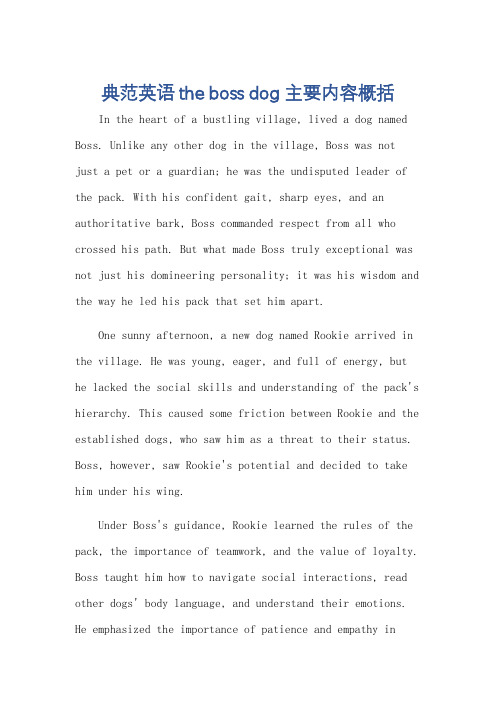
典范英语the boss dog 主要内容概括In the heart of a bustling village, lived a dog named Boss. Unlike any other dog in the village, Boss was notjust a pet or a guardian; he was the undisputed leader of the pack. With his confident gait, sharp eyes, and an authoritative bark, Boss commanded respect from all who crossed his path. But what made Boss truly exceptional was not just his domineering personality; it was his wisdom and the way he led his pack that set him apart.One sunny afternoon, a new dog named Rookie arrived in the village. He was young, eager, and full of energy, but he lacked the social skills and understanding of the pack's hierarchy. This caused some friction between Rookie and the established dogs, who saw him as a threat to their status. Boss, however, saw Rookie's potential and decided to take him under his wing.Under Boss's guidance, Rookie learned the rules of the pack, the importance of teamwork, and the value of loyalty. Boss taught him how to navigate social interactions, read other dogs' body language, and understand their emotions. He emphasized the importance of patience and empathy indealing with conflicts and encouraged Rookie to use his energy and enthusiasm to contribute positively to the pack. Boss didn't just bark orders; he led by example. He demonstrated courage and resilience in the face of challenges, whether it was protecting the village from intruders or leading the pack through difficult terrain. His actions spoke louder than words, and Rookie and the other dogs looked up to him with admiration and respect.As time passed, Rookie grew into a confident and capable member of the pack. He had learned the lessons of leadership well under Boss's tutelage and was now ready to take on more responsibilities. Boss, seeing this, knew it was time to pass on the torch. He gathered the pack and announced Rookie as his successor, stressing that it was important for the pack to continue to evolve and adapt under new leadership.The transition was smooth, and Rookie seamlessly took on the role of the leader. He carried forward Boss's legacy of unity, camaraderie, and mutual respect while also introducing new ideas and strategies that suited the changing needs of the pack. The dogs of the villageflourished under his leadership, and the pack became even stronger and more cohesive than before.Boss, although no longer the leader, remained a respected figure within the pack. He enjoyed the fruits of his labor, watching the younger generation thrive and learning from their successes. He knew that his role as a leader was not just about commanding respect but about nurturing and guiding the next generation of leaders.The story of Boss and Rookie teaches us valuablelessons about leadership. Firstly, leadership is not just about position or power; it's about influence and inspiration. Boss didn't need to bark orders to maintainhis authority; he earned respect through his actions and wisdom. Secondly, leadership requires patience and mentorship. Boss took the time to guide Rookie, instillingin him the values and skills necessary to be a great leader. Finally, leadership is about vision and innovation. Boss recognized the need for change and was willing to stepaside to allow Rookie to lead the pack into a new era.In conclusion, the story of The Boss Dog is not just about a dog's journey to leadership; it's about thetransformative power of leadership itself. It reminds us that great leaders are not born, but they are made through experience, wisdom, and the willingness to pass on their knowledge to the next generation. As we embark on our own leadership journeys, we can draw inspiration from Boss's example and strive to become the leaders our teams, communities, and world need.**《领袖之犬》的主要内容概括**在一个繁忙的村庄中心,住着一只名叫Boss的狗。
典范英语 Oh otto up打印版

典范英语2up打印版,打印前请将版面分页设置为“2up”,即可在一张A4纸上打印两页。
Oh, otto!1 Something importantThe children in Class Four were busy workingThen their teacher, Miss Underwood, said: ‘I have something very important to tell you.’She smiled and said: ‘A new boy is coming to our class. His name is Otto and he comes from far, far away. In fact, he comes from outer space…’( this is Otto’s first day at earth school. Here he is…)The door opened and a boy came in. he looked just like the other children-but he was a different colour. he was green.Miss Underwood told Otto to sit with Jo and Charlie and Josh. Then she looked at Jo and added, ‘I want you to take care of our new boy and give him a hand if he needs it.’‘plea s e, Miss,’ said Otto.‘I’m not NEW. I’m seven and a half. And I don’t already.Look!’‘Oh, Otto!’ Miss Underwood smiled. ‘just sit down and be a dear.’Otto sat down.Then he said, ‘I don’t think I can be a deer…but I can quack like a duck.’He flapped his arms, like wings, and went: ‘Quack! Quack! Quack!’Charlie joined in: ‘Quack! QUACK! QUACK!’Miss Underwood smiled at Otto. ‘No quacking n class!’ she said.Then she frowned at Charlie. ‘Charlie!’ she said. ‘you know better than that! Get on with your work.’‘It’s not fair!’ Charlie grumbled. ‘I get into trouble and that new boy doesn’t!’That’s when Charlie decided he didn’t like Otto. He didn’t like him one bit.2 Charlie is crossOtto made a lot of mistakes.Charlie leaned back on his chair. Otto tried to do the same thing. But he fell down……and so did all the paints.Now Charlie was green too-and he wasn’t happy about it.Charlie got crosser and crosser and crosser.At playtime, when Otto was in the playground, Charlie decided to scare him.‘If you stand there, you’ll get eaten by a bear,’ said Charlie.‘A bear! Where?’ Otto screamed.Charlie goggled. ‘we keep the bear in the head’s office. All Earth schools have a bear,’ he went on. ‘sometimes the bear gets out…and sometimes it’s hungry!’Otto looked very scared.3 Treasure HuntThat afternoon the class was having a Treasure Hunt. All the children were looking forward to it.Miss Underwood gave each pair of children the same clue.‘I want you to work in a pair with Otto,’ she said to Jo.‘Work in a pear?’ said Otto ‘How? It will have to be a big pear. Not too juicy. We could all get sticky.’Jo laughed. ‘Oh, Otto! You don’t understand anything! ’The Treasure Hunt began.Charlie worked with Josh. Jo worked with Otto.This was the clue that they had to follow:( start at the classroom door.Then walk along.Don’t go right.Then you won’t go wrong.)‘What does that mean?’ said Charlie.‘I don’t know,’ said Josh. ‘But when Miss Underwood hid the treasure last time, it was in the playground.’‘Let’s go there!’ Charlie said to Josh. ‘Quick! We’ll be first.’Otto jumped up to follow them-but Charlie had a plan. He stuck out his foot and tripped Otto up.‘Enjoy your trip!’ Charlie laughed, and ran off with Josh.Jo helped Otto up.All the other children ran out of the classroom and followed Charlie and Josh. They turned right, towards the playground.Jo sighed. ‘Now we’re going to be last.’‘We won’t be last,’ said Otto, ‘because they’re all going the wrong way. Look at the clue.’(Start at the classroom door.Then walk along.Don’t go right.Then you won’t go wrong.Otto pointed at the clue. ‘it means we start here-at the classroom door and we don’t turn RIGHT-because that would be wrong. We have to turn LEFT.’They set off in the other direction to the rest of the children.Charlie and Josh were looking for treasure in the playground and they were getting fed up.‘there’s nothing here,’ said Charlie. ‘Let’s look inside the school.’They went back into the school hall, past the head’s office and that’s when they saw it…‘there IS a bear!’ Charlie said. ‘there really is!’They ran screaming back to their classroom.‘Help! Help! We’ve seen a bear.’4 Oh, OttoJo and Otto had turned left and walked along the corridor.‘Look!’ said Otto.There was an arrow and it was pointing to a plant pot.Jo picked up the pot and found a map.There was another clue on the map.(clue number2Follow this map if you want to do well.Just look in the place where you find a spell.)Jo and Otto followed the map to the school library.Jo read out the clue again:Follow this map if you want to do well.Just look in the place where you find a spell.‘I understand!’ said Otto. ‘look-there’s a pile of spelling books. That’s where we’ll find a “spell!”’‘You’ve got it, Otto!’ said Jo.Behind the pile of spelling books, there was a box of golden coins. ‘Yum!’ said Jo. ‘It’s chocolate money!’Back in the classroom, Jo and Otto shared out the treasure chocolate.‘But what’s the matter with Josh and Charlie?’ asked Otto.Some of the other children laughed.‘Charlie and Josh thought they saw a bear!’‘A bear!’ said Otto. ‘Jo told me you were making up that story to scare me.’Charlie looked ashamed. ‘It wasn’t really a bear,’ he said. ‘It was the head’s big new coat hanging on the door…’‘But it LOOKED like a bear,’ said Josh.Charlie and Josh went bright red.‘Don’t worry,’ said Otto. ‘Everyone makes mistakes. Have a chocolate.’‘I’m sorry I made fun of you,’ said Charlie.Charlie looked so sad that Miss Underwood felt sorry for him.‘We’ll forgive you, Charlie,’ she said. ‘we all have bad days.’She smiled. ‘You and Josh seem to have lost your heads, today!’‘Oh!’ said Otto. ‘Shall I look for their heads, Miss? I’m good at finding things!’。
典范英语6-9书目

典范英语6-9书目第一篇:典范英语6-9书目《典范英语》(六)1.Walrus Joins in海象参加表演2.Noisy Neighbours吵闹的邻居3.Princess Pip’s Holiday皮皮公主的假期4.Oh, Otto!哦,奥托!5.Captain Comet and the Purple Planet科密特船长与紫色星球6.Jungle Shorts丛林短裤7.The Masked Cleaning Ladies of Om来自奥姆的蒙面清洁女工8.The Masked Cleaning Ladies Save the Day 蒙面清洁女工反败为胜9.The Masked Cleaning Ladies Meet the Pirates 蒙面清洁女工面对海盗10.Jellyfish Shoes水母鞋11.The Boss Dog of Blossom Street花朵街的狗老大12.Cornflake Corn玉米片硬币13.The Ghost Ship幽灵船14.Micro the Metal Dog机器狗麦克罗15.The King ofFootballThe Story of Pelé球王贝利的故事16.Arctic HeroThe Story of Matthew Henson 北极英雄——马修•汉森的故事17.Pioneer GirlThe Story of Laura Ingalls Wilder 拓荒女孩——劳拉•因格尔斯•怀尔德的故事18.My Friend, Mandela我的朋友曼德拉《典范英语》(七)1.Amy the Hedgehog Girl刺猬女孩艾蜜ing Clean坦白3.Bertha’s Secret Battle博莎的秘密招数4.Titanic SurvivorThe Story of Harold Bride 泰坦尼克号的幸存者——哈罗德•布莱德的故事5.The Big Chance大好时机6.Blackbones Saves the School布莱克博恩拯救学校7.The Wrong Letter送错的信8.Dangerous Trainers危险的运动鞋 9.The Luckless Monster不走运的怪物10.Jem Stone Genie –the Crash精灵简姆•斯通——撞击事件11.Stinky Street臭街 12.Cool Clive酷酷的克莱夫13.Robbie Woods and his Merry Men罗比•伍兹和他快乐的弟兄们14.Pass the Ball!传球!15.Here Comes Trouble来麻烦了16.Doohickey and the Robot杜希奇与机器人17.Doughnut Dilemma炸面圈的两难处境18.Scrapman and the Incredible Flying Machine 废铁人与神奇飞行器《典范英语》(八)1.Waiting for Goldie等候高蒂2.The Personality Potion性格魔水3.The Ultimate Trainers顶级跑鞋4.Black Dan布莱克•丹5.Blackbeards Last Stand黑胡子海盗最后的抵抗6.Kelly the Rescue Dog搜救犬凯莉7.Okay, Spanner, YouWin!好吧,斯潘纳,你赢了!8.Petey皮蒂9.Climbing in the Dark黑夜挣扎10.Grace the Pirate海盗格雷斯11.Air Raid!空袭!12.The Booming Boots of Joey Jones 乔伊•琼斯的大力球鞋13.Sing for your Supper用歌声换晚餐14.Tomb Raiders古墓挖掘者:发现图坦卡蒙《典范英语》(九)1.The Secret Garden秘密花园2.White Fang白牙3.Gulliver’s Travels格列佛游记4.Black Beauty黑骏马5.20,000 Leagues Under the Sea 海底两万里6.The Lost World失落的世界7.David Copperfield大卫•科波菲尔8.Frankenstein弗兰肯斯坦9.Jane Eyre简爱10.Stories of Sherlock Holmes 福尔摩斯故事集11.Robinson Crusoe鲁宾逊漂流记12.Wuthering Heights 呼啸山庄13.Treasure Island 金银岛14, Macbeth 麦克白第二篇:典范英语读后感White Fang What impressed me most is the part that White Fang broke the window, cutting it’s head but running to it’s owner.It is exactly a moving scene in our daily life.The wolf is the animal of violence and cold-blood in peoples minds.But they have kindness inward sometimes.Scott managed to used his patience and love of lives to recall the goodness of a wolf,certainly,at a price of a bite.Wild animal is just like human,if you treat them kindly,they will do the same,or even risk it’s life for you.Macbeth I wondered why Shakespeare wrote a story of a bad guy who was so greedy and mad.Then I thought that I’ve got the answer: William wanted to warning us readers.Macbesth was a man who was blinded by the power,not knowing that power can bring nothing forever but restlessness.Is there any thing more valuable than a peaceful life,without fighting or suffering?Maybe the peace of other,but it doesn’t mind Macbeth.All his desire made this misery.The lost world To my surprise this book was written by Conan Doyle.Now I’ve known how imaginative he was.The story showed the characters’ personality perfectly by describing their conversation, expressionand thought inward.What impressed me most is the part that the two professors who turned out to be enemies in a week ago shooke their hands for truth.Jane Eyre Jane was the woman who just faced the cold world with her pure warm heart.She never lost her hope ,her belief ,her courage and her self-resbect.That was why she finally lead a good life---finding her true love and staying by his side as she always wished.Even though that’s the ending which most woman won’t regard it as a happy ending,Jane was surely content with it.That was the true love only once in a lifetime.Wuthering Heights To be honest,I didn’t figure out what this story really wanted to tell.The relationship among the character was very complex, and the conflict was exciting.Those were what made the story attractive,like the seasoning which arouse the appetite.From this novel, I’ve ‘learned that we should not be drived by jealousy but kindness , not for someday people will treat you back but for our conscience.Robinson Crusoe This story took place on a barren island where was only one human being----our hero Robinson.Which was unbelievable was that he had lived there 27 years long,depending on his wisdom and bare hand.Never losing his hope,he finally got to his hometown.That brave and experienced man perfectly showed the vitality and intelligence of human.第三篇:典范英语名词典范英语6全套典范7(1至5本)名词词性归类典范6-1典范6-2 Walrus 海象grey 灰色 North Pole 北极miser 守财奴 show 表演penny 便士 Arctic Fox 北极狐smile 微笑 Polar Bear 北极熊Seal 海豹Whale 鲸(鱼)prize 奖项whisker 胡须nose 鼻子snowdrift(风吹成的)雪堆the big night 大晚会row 排;(一排)座位circle 圆圈figure 外形face 脸act(一段)表演jump 跳跃spin 旋转somersault 翻跟头head 头the Northern Lights 北极光flood 大量tear 眼泪splash 巨响flipper 鳍肢jet 喷射;喷出物[(+of)] water 水buffoon 小丑sight 视界,视域clown 小丑cheer 叫好声,喝彩声car车motorbike摩托车van 厢型车(客货两用)lorry 卡车(=truck)hammer 锤子spanner 扳手engine 发动机noise 噪音tune 曲子grand piano 大钢琴(三角钢琴,卧式钢琴) violin 小提琴drum 鼓bassoon 巴松管wall 墙music 音乐hole 洞wallpaper 墙纸cupboard 壁橱towel 毛巾letter 信stamp 邮票filling 馅sandwich 三明治trick 诡计rat 耗子fridge 冰箱midnight 半夜home家 roof 房顶tile 瓦片典范6-3 chimney 烟囱grin 冷笑Princess 公主 ghost 鬼castle 城堡 kettle 烧水壶sun hat 遮阳帽 bread 面包maid 女仆 tomato sauce 番茄酱Take-away 外卖smirk 得意的笑joy 欢乐angle 天使cymbal 铙钹(打击乐器) trumpet 喇叭,小号fistful 一把day 日子house 房子chief 头儿rag 抹布hatful 一帽子heart 心man 男人pocket 口袋peace 和平quiet 安静cellar 地下室step 楼梯pest 害虫luck 运气tool box 工具箱harp 竖琴thing东西sofa 长沙发house-warming party乔迁派对place 地方vest 马甲holiday 假日room 空位,地儿pony小马,矮脚马 coach 马车pet snake 宠物蛇arm 手臂time 时间seaside(度假的)海滨,海边door 门room 房间four-poster bed 四根柱子的大床 straw mattress草垫banquet 宴会 sprout 甘蓝小菠菜nonsense 胡说 sun chair 沙滩椅 money 钱 sun 阳光 road 路suitcase 旅行箱,衣箱backpack 背包 drawbridge 吊桥 snack 小吃fish stick 鱼条 stall 小摊,货摊stone step 石阶playground 操场 gold 金子bear 熊pool 池子the head’s office 校 stocking 长筒袜长办公室net 渔网Treasure Hunt寻宝 crown 王冠游戏sandcastle 沙子城堡children孩子 work 活儿pair 组,对 moat 护城河dobbin(俚语)大马merry-go-round旋转木马fun-fair 游乐场roller coaster 过山车heaven 天堂picnic 野餐race 赛跑pity 可惜的事典范6-4fact 事实outer space 外太空color 颜色boy 男生dear 乖乖deer 鹿wing 翅膀class 课堂work 工作trouble 批评bit 一点点mistake 差错chair 椅子 paint 颜料playtime 课间休息时间;游戏时间clue 线索pear 梨juicy(水果)多汁trip 旅行way 路rest 其余的人direction 方向school hall学校礼堂corridor 走廊arrow 箭头plant pot 花盆fun 乐趣spell 咒语library 图书馆pile 堆spelling book 拼写本golden coin 金币巧克力chocolate money巧克力钱treasure chocolate宝藏巧克力matter 问题coat 外套seat 座位典范6-5surface 表面view 视野Stardust Space Station monster 怪物星尘空间站backside 臀部 Captain站长teeth 牙齿 space shuttle太空穿jet 喷气发动机梭机turn 转弯 plant植物robot 机器人control desk 控制台button 按钮light 灯toilet 座便器Gravity 重力floor地板pot plant 盆栽植物mess 脏乱的东西rest 其他时间cleaner 吸尘器noise 声响scanner 扫描仪dot 点screen 屏幕asteroid 小行星lump 块rock 岩石slot 开口chest 前胸spike 尖桩flagpole 旗杆metal rod 金属棍flag 旗帜electric pencil sharpener 电动卷笔刀point尖头ground 地size 尺寸planet 行星idea 办法office block 办公大楼gap 缝隙speed 速度look 看bottom 屁股典范6-6coat 外套line 直线zip 拉链anorak 防水衣boots 球鞋goal 进球socks 短袜strip 球服tea 茶点pancake 摊饼knife and fork 刀叉clatter 当啷声football thing足球用品shorts 短裤market 市场mind 主意photo 照片street 街ball 球典范6-7 mum 妈妈stall 摊位castle 城堡canvas roof 帆布顶royal cleaner 王室 jungle shorts 丛林短裤/御用清洁工 wide straw hatperson 人宽檐草帽queen 王后 trousers 长裤key 钥匙tree 树monkey 猴子crowd 人群size 尺码purse 女士钱包son 小伙子fence 围墙top 尽头Monday 星期一bag 袋子the changing room更衣室back 后面back 背record 记录case 事实team 队field 操场five-a-side football五人制足球赛home time 放学时间champion 冠军kit 球服the washing line晾衣绳royal family 王室 princess 公主start 首先friend 朋友king 国王captain 上尉 washing 洗东西cleaning 卫生advert 广告招聘notice 告示cleaner 清洁工pay 工资plate 盘子singing 歌声sink 洗碗池dish 盘子job 工作dragon 龙royal tour 御驾旅行 minute 片刻quest 寻找burglar 盗贼royal case 御用衣箱lip 嘴唇 sulk 生气knock 敲门声figure 人影mask 面具dust 灰尘tablecloth 台布crash(发出猛烈 dungeon 地牢声音地)坠落 cell 牢房,囚室kick 踢球vacuum cleanerthe team captain 吸尘器队长nozzle 吸口trainer 培训员 house work家务country 国家 smell 味道twist 蠢货 polish 抛光剂hum 嗡嗡声feel 手感soap flake 肥皂片truth 真话trouble 困扰success 成功典范6-8song 歌majesty 陛下butler 男管家cup 奖杯try 尝试,努力word 歌词the cup final 决赛Carrot Castle 胡萝卜城堡队cheat 骗子manager 经理message 信lot 那拨人red 红的(衣服)a training session训练课wizard 巫师dribble 哈喇子rice pudding 大米布丁shirt 衬衫goal 进球football fan’s outfit 足球迷的行头the dining room 餐厅sigh 叹了一口气mouse 老鼠shoulder 肩膀marmalade 橘子酱mean 意思kit 球衣dozen 几十,许多 [(+of)] duster 掸子cannon 大炮drawbridge 吊桥bush 灌木丛net 球门网grime 污垢cooker 灶具brass 铜器keyhole 钥匙孔a watch on a chain 怀表tactic 战术penalty kick 罚球overall 罩衫bucket 桶washerwoman 洗衣女工parcel 包裹Pay Day 薪水日 royal box 御用包厢purse 钱包 pitch 足球场nil 零典范6-10 polish 擦亮jelly shoe水晶塑料鞋raspberry jelly 典范6-9树莓果冻Royal treasure track 鞋印王室宝物model 模型Great Grandfather 曾祖父postman 邮递员news 消息crown 王冠cleaning ladies清洁女工castle 城堡scrub 擦洗job 活secret 秘密moment 一会age 时间cry 叫喊gang 帮pirate 海盗plank 踏板shark 鲨鱼telescope 单筒望远镜dirt 污垢soap 肥皂duster 掸子shield 盾徽,盾牌the main hall 大厅camera 相机apron 围裙trumpet 小号jellyfish 水母 cow-pat 牛粪团puddle 水洼sting 蛰pong 恶臭bin bag 垃圾袋wave 海浪shore 海岸sackful 满袋fly 苍蝇dream 梦toe 脚趾winkle 螺丝parachute 降落伞jewel 宝石rock pool 岩石池子baby 小崽rainbow 彩虹line 行,排whale 鲸(鱼)dolphin 海豚octopus 章鱼 6-11Blossom Street花朵街 doorstep 门阶lamppost 路灯杆tail 尾巴scrap 残羹剩饭典范pram 婴儿车treasure hunter back yard 后院寻宝者owner 主人excitement 激动 Doggy Chunktreasure coin 宝币狗狗物品writing 文字boss dog 狗老大edge 边缘Yorkie 约克夏狗cereal 麦片ribbon 丝带copy 复制品bow 蝴蝶结wimp 窝囊废Foofoo pie 福福馅饼doggie 狗狗bulldog 英国斗牛狗path 小路shopping bag购物袋day off 休假日front room 客厅knock 敲门reporter 记者The Daily Snoop《每日探报》photo 照片front page 头版the headline 大标题典范6-12find 发现long grass 深草lunchtime 午饭时间school field 操场coin 硬币competition 比赛area 地区trip 旅行Space Fun Park太空娱乐园free gift 赠品plenty(of)很多cornflake coin玉米片硬币cover 封面 a)blue and write china teacup 青花瓷茶杯cupboard 橱柜bench 长椅bushes 灌木丛canal 运河sweet packet 糖果包picnic 野餐café 咖啡厅,快餐店lead 狗绳muddy hole 泥坑digger 挖掘机cardboard box 纸箱editor 主编excitement 骚动elbow 胳膊肘thundercloud 乌云典范6-13ghost 鬼,幽灵fence 栅栏Head 校长netball pos蓝网球柱子glow 亮光(seagull 海鸥blur 影子 caretaker 看门人jaws 双腭 the small one 小家伙straw 麦草 at break 课间休息machine 机器captain 船长rubbish chute 垃圾道 board 船basement 地下室 bin 垃圾箱rubbish bag 垃圾袋 treasure hunting silver 银寻宝metal detector金属探测仪spade 铲deck 甲板Treasure Island珍宝岛ping “呯”的声音chest 箱子典范6-14birthday 生日kennel 狗窝flat 公寓carpet 地毯metal 金属pet 宠物all day and all night整天整夜brightness 光泽balcony阳台stick 木棍owner 主人fire 火光button 按钮lift 电梯toilet bowl 马桶racket 吵闹circle 圆圈tongue 舌头bark 吠pizza 比萨饼典范6-15dream 梦想injury 职业trial 试用机会club(足球)俱乐部reward 奖赏回报goal 进球pearl 珍珠international game 国际锦标赛fan 球迷Sweden 雅典Brazilian team巴西队Soviet Union 苏联队 semi-final game半决赛hat-trick 帽子戏法pitch 足球场moment 时刻Chile 智利tournament 锦标赛target 目标magic 魔力stamp 邮票Mexico 墨西哥Italian 意大利a training camp expert 专家训练营ice field 雪地kick-off 开球meteorite 陨石header 头球natural history自然keeper 守门员历史pass 传球musk ox 麝香牛charity work 慈善工作bullet 子弹children’s charity camp 营地儿童慈善事业典范6-16 introduction 引言explorer 探险家North Pole 北极danger 危险Arctic 北极adventure 历险cabin boy 船舱服务员deck 甲板servant 仆人jungles 丛林Central America中美洲survey team勘察队quicksand 流沙expedition 探险队heat 高温Greenland 格陵兰岛the Inuit people因纽特人skill 技巧charr 嘉鱼seal 海豹igloo 雪屋animal skin 动物皮毛sledge 雪橇husky dog 哈士奇犬attempt 尝试frostbitten 冻伤pain 疼痛base camp 大本营toe 脚趾blizzard 暴风雪fur 皮毛衣物equipment 设备dynamite 炸药coast 海岸warning 警告support team后援队journey 旅程speed 快速disappointment失望 actual photo实际照片claim 说法hoax 骗局fame 名望medal 奖章respect 尊重reward 奖赏explorer 探险家niece 侄女glory 光荣honor 荣誉programme 节目典范6-17 pioneer 扩荒者enemy 敌人State(美国)洲fever 热病adventure 历险river bank 河岸wolf 狼schooling 学校教育log 原木willow tree 柳树quilt 棉被plum 李子beginning 开始creek 溪woods 树林replica 仿制品member 成员guard dog 看门狗panther 黑豹sugar(食)糖maple tree 枫树pan平底锅sugar loaves 糖块Christmas 圣诞节maple syrup 枫树糖浆candy shape 糖果形状travel 旅行wagon 四轮马车tent 帐篷fiddle小提琴gun 枪firelight 火光wagon 车轮grassland 草地Indian country印第安人居住区the prairies 大草原prairie chicken草原松鸡stool 凳子visitor 造访者feather 羽毛cornbread 玉米饼earth wall 土墙ceiling屋顶,天花板willow branch柳枝hay 干草chimney 烟囱crop 庄稼crab 螃蟹fancy clothe高级衣服mud 泥grasshopper 蝗虫railroad camp 铁路工地railway 铁路town 城镇church 教堂farm land 农田feed 饲料snowstorm 暴风雪oil for the lamps灯油supplies 供应 a College for the Blind 一所盲人学校wagon journey 马车旅行shelf 搁板shepherdess牧羊女典范6-18lawyer’ office律师struggle 斗争事务所blanket 床单apartheid 种族隔离prisoner 囚徒surfer 冲浪country 农村African National Congress the Indian Ocean非洲国民大会印度洋army 军队hut 小屋boxer 拳击运动员beehive 蜂窝communal pot公用陶盆samp 玉米粥porridge 粥cob 玉米棒herd boy放牛(羊)娃tag 捉人hide-and-seek 捉迷藏chief 酋长tummy 肚子mission school教会学校Methodist Church循教教会admiral 海军上将blow 打击cousin 表亲education 教育regent 摄政王royal palace 王宫site 所在地boarding school寄宿学校Fort Hare University 福特哈尔大学troublemaker 惹是生非的人law 法律mine 矿井protest 抗议commander-in-chiefSpear of the Nation 民族之矛beard 胡子chauffeur 司机freedom 自由prison 监狱Robbin Island罗宾岛penguin 企鹅antelope 羚羊fortress 要塞cell 囚室mat 席子sandal 凉鞋lime quarry 石灰石采石场Christmas pudding 圣诞布丁loved one 亲人pop concert 流行音乐会nuisance 麻烦BBC英国广播公司Buckingham Palace 白金汉宫boyhood 孩童时期segregation 隔离总司令minority 少数人grub 食物 National Party国家党drink 饮料sportspeople运动员pound 镑event 赛事admission 入场费 generation 一代biscuit 饼干 athlete 体育家,运动员smile 微笑note 纸钞典范7-1patrol 巡逻wildlife 野生动物hedgehog 刺猬expert 专家sort 种类Africa 非洲India 印度Britain 英国animal 动物lump 块carrot 胡萝卜spray gun 喷枪slug 鼻涕虫snail 蜗牛cassette tape盒式磁带set 套,组personal stereo个人立体音响door bell 门铃poison 毒药knees 双溪a rusting noise窸窸索索的声音lawn 草坪a torch beam一束手电筒的光线beast 畜生look 表情gate 大门marrow 西葫芦runner bean菜豆local show当地展示会tin 罐典范7-2Baggy-Pants肥裤子jam roly-poly果酱馅蛋糕卷hall 大厅dish-cloths洗碗布fork 叉子suit 套装crease 皱Parent’s Evening家长晚会custard 蛋黄沙司curtain 帘子,幕布vest 背心monster 怪物blood-shot bits血丝bolt 闪电stuff 东西background 背景towel 毛巾mark 斑hanger 衣架home time回家时候staffroom职员休息室sink 洗手池darling 宠儿tap 水龙头Fairplay 公平比赛 plastic 塑料rope 围绳 washing-up liquid cheer 欢呼清洗剂crowd 人群stain 污渍kiss吻glue 胶水opponent 对手anorak 防水衣hinge 合页cycle clip裤腿夹rubbish 垃圾heap 堆accident 意外washing power洗衣粉brush 刷子bubble 泡泡polish 上光剂floor cleaner地板清洗剂dirt 尘土dry-cleaner干洗店bundle 一团东西spanner 扳手chip 薯条smoke 烟flame 火焰典范6-3twin 双胞胎cottage 村舍Town Hall市政厅sign 告示wrestling competition摔跤比赛referee 裁判员star明星dressing room更衣室the Bone Cruncher 碎骨者fist 拳头corner 角落round 角落cocoa 可可the flying tail spin 飞身尾旋mood 心情goldfish bowl金鱼缸cartwheel 侧身翻move 动作Head(硬币)正面Tail(硬币)反面hair colour 染发剂kitten 猫kitty 猫咪swing 秋千park keeper 公园管理员size 尺寸trolley 购物车trick 诡计manager 经理customer 顾客hair colour发色big fight 大战monster of the ring 拳击场怪物bunch 束position 位置paid 报酬bridge 船桥crew 船员典范7-4lifeboat 救生艇Atlantic Oceandanger 危险大西洋radio call 无线电呼叫Titanic 泰坦尼克号signal for help求救voyage 航行信号radio room无线电室part 角色disaster 海难Queen of the Seas 海上皇后hero 英雄radio operator无线电报务员breath 呼吸passenger 乘客Southampton南安普敦first-class 头等舱swimming pool 游泳池one-way ticket单程票deck 甲板menu 菜单message 报文Morse Code莫尔斯码radio cabin报务舱iceberg 冰山warning 警告accident 事故midnight 半夜assistance帮助truth 事实overcoat 大衣lifebelt 救生衣power 电力engine room轮机舱wireless 无线电台band 乐队rowlock 浆架remain残余部分instruction 指令dawn 黎明distance 远处survivor 幸存者rope ladder 绳梯land 陆地act 举动bravery 英勇典范7-5 half-time 半场休息changing room更衣室lad 小伙子shower room淋浴间fault 错误goalkeeper守门员tea stand茶摊caravan 5宿营车queue 队伍cup 奖杯dash 点trolley 推车bang “砰”gulp 口skirt 裙子tool 工具apron 围裙hankie 手帕jumper 毛衣tea machine售茶机sleeve 袖子pitch 足球场the goal area 射门区the cross bar横梁supporter 支持者bin 垃圾桶game 比赛group 伙goalpost 球门柱terrace 看台puddle 水洼the second half 下半场比赛back 后背ledge 窗台tea urn 茶水桶crash 撞击声save 救球tea lady沏茶女工sob 哭temper 发脾气goalie 守门员 crowd 人群 scarf 围巾 squirt 小瘪三 attack 进攻draw平局extra time加时赛 the final whistle 终场哨声第四篇:典范英语4《典范英语》(6_04)教案Oh, Otto!《教学参考》的目的在于为实验课提供一个基本的思路和框架,帮助实验教师更好地把握课题理念。
中国教育报:教材就应该让学生有兴趣

中国教育报:教材就应该让学生有兴趣《典范英语》教材插图一套优秀的外语学习材料应该最大限度满足儿童学习的需要,创造各种有利的条件,吸引、引导、激发少年儿童喜爱这套教材,进一步喜爱这门学科;让教材适应儿童学习规律,而不是削足适履让儿童去适应教材,这才是成功的教材所应具有的特质。
■本报记者郭铭《典范英语》原名《牛津阅读树》,是风靡英国的母语学习教材,在英国有80%的学校在使用,全球有133个国家使用它教学生学习英语。
这套教材的特点是集故事性、趣味性、知识性、科学性和人文性于一身,对于中国学生学习英语产生了重大的推动作用。
这套从英国牛津大学出版社引进的英语教材,自2008年在我国问世以来,先后被数百所学校列为英语必读材料,深受中小学教师、学生和家长喜爱。
而今又出版了新版和大字版。
但是,中国目前少年儿童英语学习的现状却令人忧心忡忡,很多孩子的厌学情绪让家长头疼不已,而大多数学习过英语科目的毕业生,毕业之际就是把英语知识和能力还给学校之时。
研究表明,学习内容的不恰当和教材的无趣是导致许多学生丧失英语学习兴趣的最主要因素。
虽然教材的版式设计越来越花哨,但教材文字本身内容枯燥,缺乏美感,可以说是“有句无文,有文无情”。
研究认为,国内绝大多数小学、初中、高中英语教材是以话题为主进行设计的。
课文的话题是根据特定的语法和结构进行编写的,这些话题往往以交际为中心,以满足在国外生活为目的,具有很强的实用主义色彩,但缺乏人文关怀,背离了儿童学习的原则和规律。
这就导致了英语课堂片面注重语言知识和听、说、读、写技能的训练,为“实用”而教,为“考试”而教,背离了英语学科作为一门教育学科的本质,忽视了语言教育的第一要义,即通过地道的语言和有趣、有意义的内容对学生进行文化教育、人文教育和能力培养。
其实,对于语言学习,大多数学生感兴趣的不是语言符号本身,而是语言承载的内容和意义。
儿童天生喜欢故事,一篇有趣的故事往往能激发孩子的好奇心和想象力,引起他们的兴趣。
新浪教育:典范英语成为“领头羊”
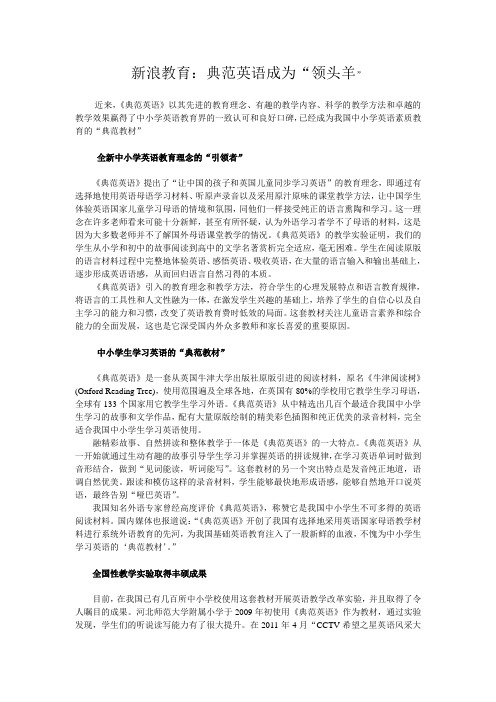
新浪教育:典范英语成为“领头羊”近来,《典范英语》以其先进的教育理念、有趣的教学内容、科学的教学方法和卓越的教学效果赢得了中小学英语教育界的一致认可和良好口碑,已经成为我国中小学英语素质教育的“典范教材”全新中小学英语教育理念的“引领者”《典范英语》提出了“让中国的孩子和英国儿童同步学习英语”的教育理念,即通过有选择地使用英语母语学习材料、听原声录音以及采用原汁原味的课堂教学方法,让中国学生体验英语国家儿童学习母语的情境和氛围,同他们一样接受纯正的语言熏陶和学习。
这一理念在许多老师看来可能十分新鲜,甚至有所怀疑,认为外语学习者学不了母语的材料,这是因为大多数老师并不了解国外母语课堂教学的情况。
《典范英语》的教学实验证明,我们的学生从小学和初中的故事阅读到高中的文学名著赏析完全适应,毫无困难。
学生在阅读原版的语言材料过程中完整地体验英语、感悟英语、吸收英语,在大量的语言输入和输出基础上,逐步形成英语语感,从而回归语言自然习得的本质。
《典范英语》引入的教育理念和教学方法,符合学生的心理发展特点和语言教育规律,将语言的工具性和人文性融为一体,在激发学生兴趣的基础上,培养了学生的自信心以及自主学习的能力和习惯,改变了英语教育费时低效的局面。
这套教材关注儿童语言素养和综合能力的全面发展,这也是它深受国内外众多教师和家长喜爱的重要原因。
中小学生学习英语的“典范教材”《典范英语》是一套从英国牛津大学出版社原版引进的阅读材料,原名《牛津阅读树》(Oxford Reading Tree),使用范围遍及全球各地,在英国有80%的学校用它教学生学习母语,全球有133个国家用它教学生学习外语。
《典范英语》从中精选出几百个最适合我国中小学生学习的故事和文学作品,配有大量原版绘制的精美彩色插图和纯正优美的录音材料,完全适合我国中小学生学习英语使用。
融精彩故事、自然拼读和整体教学于一体是《典范英语》的一大特点。
《典范英语》从一开始就通过生动有趣的故事引导学生学习并掌握英语的拼读规律,在学习英语单词时做到音形结合,做到“见词能读,听词能写”。
京城学校用《典范英语》实现突破

中国青年报:京城学校用《典范英语》实现突破首都师范大学附属育新学校中学部初二年级学生在上《典范英语》课首都师范大学附属育新学校是一所由北京市教委、首都师范大学和海淀区教委直接领导的12年制公办学校。
学校整体教研氛围浓厚,教育教学理念超前,但随着课程改革的推进,该校的英语教学一度陷入“平原区”:教师、学生、家长在英语方面的投入加大,收效却不明显。
经过反思,学校领导和老师发现,导致这一现象出现的原因主要在于学校的英语教学理念出现了误区,英语教学长期停留在语言的工具性层面,强调教授语言知识,训练语言技能,却忽略了语言的本质及其人文性特征。
在这一教学理念的影响下,该校教师不断扩充教材内容,补充课后练习。
但无论教学设计如何精彩,这种以交际为主的教学内容都难以激发学生的学习兴趣,难以走进他们的内心,无法满足他们的心理与精神需求。
最后学生和家长普遍抱怨作业多,甚至侵占了其它学科的学习时间。
由于教学效率低,学校的英语成绩一路下滑,中考英语成绩甚至滑到了海淀区第15名。
对此,该校领导高度重视,一致认为转变教学观念,调整教学内容是学校英语课程改革的当务之急。
此时,张金成校长和吕金刚副校长接触到了北京外国语大学中国外语教育研究中心主持的全国教育科学“十一五”规划教育部重点课题“中国基础英语素质教育的途径与方法”。
两位校长敏锐地感觉到这正是该校英语教学的出路所在,于是马上组织全体英语教师开会,向大家传递了课题组所倡导的教育理念:语言教育是精神层面的教育,而非仅仅传授语言知识和技能,语言教师是学生精神世界的塑造者和思想智慧的启迪者。
出于对这一先进教育理念的认同,全校上下迅速投入到以课题实验为指导的英语课程改革当中。
实验初期,该校只有初一、初二两个年级参加。
到2010年,初中部所有班级全部参加实验,课时量也由最初的每周一课时,到现在的初一4课时,初二2-3课时,初三第一学期仍坚持阅读实验教材。
由于实验教材受到广大学生和家长的欢迎,学校高中部分学生也参加到实验当中,小学部也逐步进入实验。
典范英语.docx

《典范英语》《典范英语》是我国有选择地采用英语国家母语教学材料进行系统外语教育第一套书籍,对传统教学法的改革具有积极而又深远的意义。
首先典范英语改变了传统的英语教育理念,倡导“在故事中轻松、快乐、自然习得英语” ,强调“融语言学习于故事之中”,根据学生的心理特点,科学而又巧妙地将英语词汇、语法、句型融于学生喜爱的故事之中,全面激发学生学习英语的兴趣,让学生不再觉得学习英语是一件枯燥乏味的事情。
同时,强调“让学生不出国门就能接受英国纯正的语言熏陶”,通过原汁原味的英语母语学习材料和原声录音,让中国学生直接体验英国学生学习母语的情境和氛围。
其次典范英语改变了传统的英语教育内容,它不以“实用”、“速成”为目标,而是以培养学生的兴趣、想象能力和思维能力、提高学生的综合语言素养为目标,把语言教育和故事学习有机地结合起来,语言鲜活地道,内容生动有趣,引人入胜。
学习这样的材料,可以激发思考,丰富想象,开拓视野,启迪心智,陶冶情操,提升文化素养。
第三典范英语改变了传统的英语教育方法,它融故事阅读、自然拼读和整体教学于一体,旨在通过故事阅读营造一种英语母语学习氛围,让学生在故事中充分体验英语学习的乐趣,自然而然进入英语思维和对话状态。
此外,让学生从一开始就学习并掌握拼读规律,在记忆单词时做到音形结合,看到单词就能拼读出来,不需要通过查词典解决读音问题。
在教学上注重从完整的内容出发,而不是从语言形式出发,让学生完整地体验语言、感悟语言、吸收语言,通过大量的语言输入和积累,奠定英语的语感。
研究的内容:1 、培养学生语感的方法研究;在高中阶段,阅读能力的培养不能仅靠少量的课本精读材料,更重要的是要有一定量的泛读材料。
因为到了高中阶段,在进一步提高听说能力的同时,要侧重培养阅读能力。
阅读是一种能力,又是语言学习的一种方法。
阅读时,学生的眼,口耳脑同时并用,可以帮助理解和吸收书面信息,巩固记忆,有利于动脑筋思考。
有助于扩大词汇量,丰富语言知识,了解英语国家的社会文化背景等。
中国教育报《典范英语》—基础英语教育改革的“引领者”
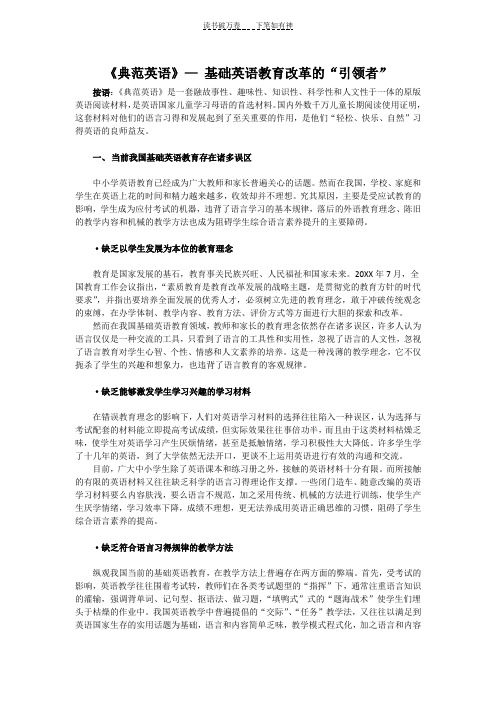
《典范英语》—基础英语教育改革的“引领者”按语:《典范英语》是一套融故事性、趣味性、知识性、科学性和人文性于一体的原版英语阅读材料,是英语国家儿童学习母语的首选材料。
国内外数千万儿童长期阅读使用证明,这套材料对他们的语言习得和发展起到了至关重要的作用,是他们“轻松、快乐、自然”习得英语的良师益友。
一、当前我国基础英语教育存在诸多误区中小学英语教育已经成为广大教师和家长普遍关心的话题。
然而在我国,学校、家庭和学生在英语上花的时间和精力越来越多,收效却并不理想。
究其原因,主要是受应试教育的影响,学生成为应付考试的机器,违背了语言学习的基本规律,落后的外语教育理念、陈旧的教学内容和机械的教学方法也成为阻碍学生综合语言素养提升的主要障碍。
·缺乏以学生发展为本位的教育理念教育是国家发展的基石,教育事关民族兴旺、人民福祉和国家未来。
20XX年7月,全国教育工作会议指出,“素质教育是教育改革发展的战略主题,是贯彻党的教育方针的时代要求”,并指出要培养全面发展的优秀人才,必须树立先进的教育理念,敢于冲破传统观念的束缚,在办学体制、教学内容、教育方法、评价方式等方面进行大胆的探索和改革。
然而在我国基础英语教育领域,教师和家长的教育理念依然存在诸多误区,许多人认为语言仅仅是一种交流的工具,只看到了语言的工具性和实用性,忽视了语言的人文性,忽视了语言教育对学生心智、个性、情感和人文素养的培养。
这是一种浅薄的教学理念,它不仅扼杀了学生的兴趣和想象力,也违背了语言教育的客观规律。
·缺乏能够激发学生学习兴趣的学习材料在错误教育理念的影响下,人们对英语学习材料的选择往往陷入一种误区,认为选择与考试配套的材料能立即提高考试成绩,但实际效果往往事倍功半,而且由于这类材料枯燥乏味,使学生对英语学习产生厌烦情绪,甚至是抵触情绪,学习积极性大大降低。
许多学生学了十几年的英语,到了大学依然无法开口,更谈不上运用英语进行有效的沟通和交流。
典范英语1-5教师评说

通过对我校学生和我自己的孩子学习《典范英语》的观察,我发现,只有能激发孩子兴趣的学习材料,孩子才会学得起劲,学得轻松,学得快乐。
《典范英语》就是这样一套能真正激发孩子兴趣、易学易用的好教材!河北师范大学附小书记裴红彬《典范英语》打开了中国传统的“一张嘴+ 一支粉笔+ 一块黑板”教育模式的枷锁,解放了老师,也解放了学生。
其内容生动、活泼、有趣,贴近学生的生活,潜移默化地感染和丰富了儿童的生活世界,体现了新课标“以人为本”的教育理念,比以往任何教材更加关注学生的情感、生活体验及成长的历程和乐趣。
它彻底颠覆了以往教材的枯燥无味,能真正让学生积极主动参与学习并得到学习的愉悦感,营造了良好的文化学习氛围,让学生耳濡目染,水到渠成。
深圳市育才一小英语教师杨兰自从使用《典范英语》这套教材后,孩子们的学习兴趣明显提高了,对知识的渴望更加迫切了,也更喜欢读书了,而且慢慢养成了阅读的好习惯。
沈阳市浑南新区第一小学英语教师石途第一次见到《典范英语》就很心动。
它完全改变了传统的英语教学模式,每一个故事都生动易懂,并且图文并茂,很符合小学生爱读故事的心理特征。
从故事的内容和出现的句型可以看出,每个故事都是精心编写的,最主要的是句型在情境中不断重复,学起来一点都不难。
故事还结合了自然拼读法,帮助学生在记忆单词时做到音形结合,符合英语语言的学习规律。
杭州江南实验学校英语教师冯丽娜我觉得《典范英语》非常好,孩子们学了几个月明显进步了,不仅兴趣提高了,语音、语调也越来越标准了。
苏州国际外国语学校英语教师曹敏我觉得《典范英语》是一套很不错的教材,的确非常生动有趣,学生学习的积极性有了很大的提高。
教材中的句子比较口语化,语音语调标准、有趣,同学们都喜欢模仿,大大提高了他们的口头表达能力。
教材中的图画也很漂亮,学生感兴趣,调动了他们的想象力。
天津北辰实验小学英语教师王蕊《典范英语》给孩子们提供了生动有趣、丰富多彩的故事,语言浅显易懂,朗朗上口,非常适合孩子学习,让孩子们在阅读故事的过程中,自然而然地习得了语言。
《典范英语》阅读教学探究

《典范英语》阅读教学探究作者:曹小雪来源:《学校教育研究》2019年第01期“得阅读者得天下”,阅读能帮助孩子们打开视野,拓展知识面,又能培养语感,是语言学习的绝佳渠道。
《英语课程标准》规定,小学生在毕业前至少应该达到二级目标。
二级目标对于读的要求是:能够借助图片读懂简单的故事或小短文,并养成按意群阅读的习惯;能正确朗读所学的故事或小短文。
也就是说,小学生应该掌握基本的阅读技巧,并且能够阅读符合年龄段的英文读物。
为了提升学生的英语阅读水平与阅读理解能力,培养学生良好的英语阅读习惯,我校于2015年9月开始在一、二年级开展以《典范英语》阅读为核心的教学与探究。
一、实验操作基本模式兴趣是最好的老师。
对于阅读教学来说,好的学习材料是激发学生阅读兴趣的关键因素之一。
《典范英语》作为享誉世界的外语学习教材,语言纯正地道,内容生动有趣且贴近学生生活,是我校推进英语阅读的首选。
在教学过程中,我们的《典范英语》阅读主要分为课上和课后两部分。
1.课堂阅读(In-Class Reading)在课上,我们主要进行Shared Reading.在此过程中,学生并不是无准备地阅读,而是一边阅读一边思考,最终在阅读后完成教师布置的Graphic Organizers.研究表明,Graphic Organizers能够有效地提高学生的阅读水平,并且能够帮助学生在阅读过程中整理获得的信息,激活已有的认知结构,同时把新的知识和原有的知识相结合(Burke, 2009)。
当然,这也对教师提出了更高的要求,课堂上教师要通过板书帮助学生理清思路,排除阅读中出现的障碍,使学生能够更高效地进行阅读活动。
另外,在课堂阅读的部分,我们还根据学生阅读水平进行了分层,为阅读水平较高的学生提供更高级别的读物和阅读任务,实现了同一班级,同一时间做不同的事情,照顾到了不同层次学生的需求。
2.课后阅读(After-Class Reading)在课后,我们每周都会给学生布置两本《典范英语》故事的阅读任务,同时通过不同层级的Reading List来帮助学生对自己的阅读过程进行记录。
典范英语绘本教学在小学阶段对学生英语学习的促进作用---以深圳龙华区同胜学校为例
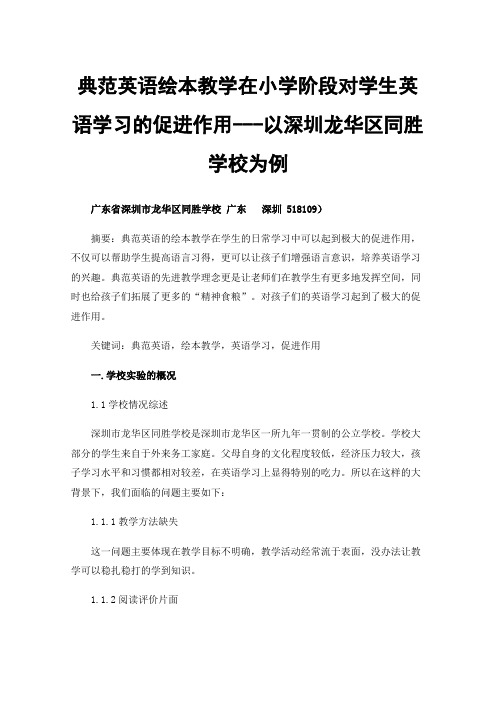
典范英语绘本教学在小学阶段对学生英语学习的促进作用---以深圳龙华区同胜学校为例广东省深圳市龙华区同胜学校广东深圳518109)摘要:典范英语的绘本教学在学生的日常学习中可以起到极大的促进作用,不仅可以帮助学生提高语言习得,更可以让孩子们增强语言意识,培养英语学习的兴趣。
典范英语的先进教学理念更是让老师们在教学生有更多地发挥空间,同时也给孩子们拓展了更多的“精神食粮”。
对孩子们的英语学习起到了极大的促进作用。
关键词:典范英语,绘本教学,英语学习,促进作用一.学校实验的概况1.1学校情况综述深圳市龙华区同胜学校是深圳市龙华区一所九年一贯制的公立学校。
学校大部分的学生来自于外来务工家庭。
父母自身的文化程度较低,经济压力较大,孩子学习水平和习惯都相对较差,在英语学习上显得特别的吃力。
所以在这样的大背景下,我们面临的问题主要如下:1.1.1教学方法缺失这一问题主要体现在教学目标不明确,教学活动经常流于表面,没办法让教学可以稳扎稳打的学到知识。
1.1.2阅读评价片面这一问题使得对学生的评价不全面,评价不系统,缺少合适的评价工具,所以到最后对孩子的评价不够完整,比较片面。
1.1.3阅读的体验有所缺失孩子们缺少阅读思维,缺乏阅读内部动机。
所以针对以上的这些问题,我们开始想办法能不能有一些新的教学方式和教学内容来激发孩子学习英语的兴趣,并且可以培养孩子良好的的语言学习习惯。
在这个时候典范英语进入了我们的视野,这是一套非常实用,对孩子语言习得非常有好处的教材。
1.2开展典范的前期工作1.2.1理念输入学校负责人在家长会上给家长进行培训给家长输入课题组全新的英语学习理念,并且承诺给予家长全面的支持。
家长们都非常认同这一理念,同意孩子们学习典范英语。
1.2.2家校配合接下来家长就会全面配合学校的工作,家长一致同意并且支持学校开展相应的课题工作。
家委会自发的组织购买实验教材。
1.2.3最后的重任就落在老师身上,老师们经过努力,克服要同时上两套教材的不适应的情况。
新京报:《典范英语》热京城
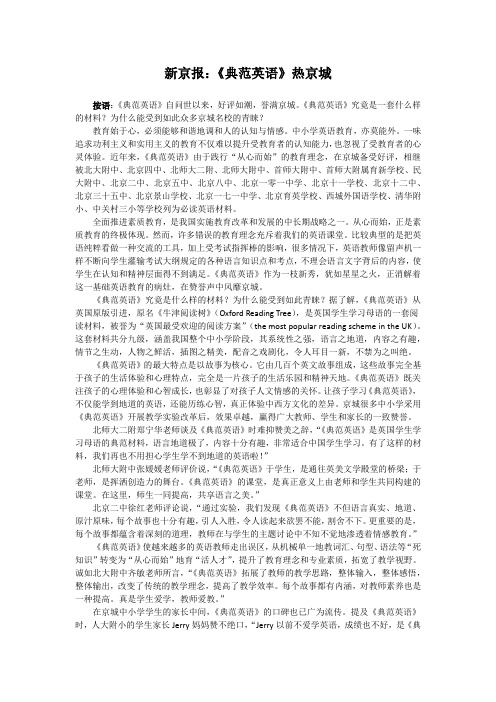
新京报:《典范英语》热京城按语:《典范英语》自问世以来,好评如潮,誉满京城。
《典范英语》究竟是一套什么样的材料?为什么能受到如此众多京城名校的青睐?教育始于心,必须能够和谐地调和人的认知与情感。
中小学英语教育,亦莫能外。
一味追求功利主义和实用主义的教育不仅难以提升受教育者的认知能力,也忽视了受教育者的心灵体验。
近年来,《典范英语》由于践行“从心而始”的教育理念,在京城备受好评,相继被北大附中、北京四中、北师大二附、北师大附中、首师大附中、首师大附属育新学校、民大附中、北京二中、北京五中、北京八中、北京一零一中学、北京十一学校、北京十二中、北京三十五中、北京景山学校、北京一七一中学、北京育英学校、西城外国语学校、清华附小、中关村三小等学校列为必读英语材料。
全面推进素质教育,是我国实施教育改革和发展的中长期战略之一。
从心而始,正是素质教育的终极体现。
然而,许多错误的教育理念充斥着我们的英语课堂。
比较典型的是把英语纯粹看做一种交流的工具,加上受考试指挥棒的影响,很多情况下,英语教师像留声机一样不断向学生灌输考试大纲规定的各种语言知识点和考点,不理会语言文字背后的内容,使学生在认知和精神层面得不到满足。
《典范英语》作为一枝新秀,犹如星星之火,正消解着这一基础英语教育的病灶,在赞誉声中风靡京城。
《典范英语》究竟是什么样的材料?为什么能受到如此青睐?据了解,《典范英语》从英国原版引进,原名《牛津阅读树》(Oxford Reading Tree),是英国学生学习母语的一套阅读材料,被誉为“英国最受欢迎的阅读方案”(the most popular reading scheme in the UK)。
这套材料共分九级,涵盖我国整个中小学阶段,其系统性之强,语言之地道,内容之有趣,情节之生动,人物之鲜活,插图之精美,配音之戏剧化,令人耳目一新,不禁为之叫绝。
《典范英语》的最大特点是以故事为核心。
它由几百个英文故事组成,这些故事完全基于孩子的生活体验和心理特点,完全是一片孩子的生活乐园和精神天地。
北京晨报:选择《典范英语》的十大理由

选择《典范英语》的十大理由一、这是一套闻名英国、享誉世界的英语学习材料《典范英语》原名《牛津阅读树》(Oxford Reading Tree),是一套从英国牛津大学出版社原版引进的闻名英国、享誉世界的英语母语学习材料。
在英国,有80%的学校用它来教学生学习母语,被誉为“英国最受欢迎的阅读方案”(the most popular reading scheme in the UK)。
在全球,有133个国家用它来教学生学习外语。
二、这是一套理念先进、注重人文教育的英语学习材料语言不仅是交流的工具,认知的工具,更是文化的载体。
让学生在提高英语水平的同时,学习文化,启迪心智,热爱生命,是《典范英语》秉持的理念和追寻的目标。
《典范英语》回归语言教育之本,让学生浸泡在具有人文内涵的故事和文学读本中,整体输入,整体感悟,整体输出,轻松、快乐、自然地习得英语。
三、这是一套符合学生心理特点和认知规律的英语学习材料心理学研究表明,儿童天性好奇,喜欢探索。
青少年则处于人生观、世界观、价值观成形的关键时期。
《典范英语》深谙学生心理,让儿童驰骋于充满探险和富有想象力的故事世界,让青少年浸泡于世界文学经典的海洋,心智得到了启发,心灵得到了启迪。
四、这是一套语言地道,融故事性、趣味性、知识性和科学性于一体的英语学习材料读故事学英语是学生学好英语的最佳途径。
《典范英语》以故事为核心,语言纯正地道,内容生动有趣,人物活灵活现,插图精美细腻,把美德、文化、百科、历史、地理等巧妙地融合在引人入胜的故事中,设计科学合理,让学生爱不释手,是学生学习英语的最佳材料。
五、这是一套分级科学、涵盖整个中小学阶段的英语学习材料《典范英语》共分九级,由浅入深,循序渐进。
《典范英语》(1-5)针对小学生,包含261个妙趣横生的故事,几个鲜活可爱的人物贯穿故事始终,是一片儿童精神乐园,是一套经典“故事大王”。
《典范英语》(6-9)面向中学生,汇集了64部引人入胜的文学读本,包括童话、人物传记、文学经典等,是一套真正意义上的中学生必读作品。
- 1、下载文档前请自行甄别文档内容的完整性,平台不提供额外的编辑、内容补充、找答案等附加服务。
- 2、"仅部分预览"的文档,不可在线预览部分如存在完整性等问题,可反馈申请退款(可完整预览的文档不适用该条件!)。
- 3、如文档侵犯您的权益,请联系客服反馈,我们会尽快为您处理(人工客服工作时间:9:00-18:30)。
上海市行知中学于2007年将《典范英语》融入正常教学当中,经过多年的教学实验,学生的词汇量不断增加,阅读速度不断加快,良好的阅读习惯基本形成,运用简洁地道的语言撰写读书报告的能力明显得到提升,“语言能力、文化能力、思维能力”的三维目标实现突破。课题实验也带动了考试成绩的提高,2010年和2011年该校高考成绩高出全市平均分18分。
上海外国语大学原校长戴炜栋教授认为:“学英语没有大量的输入产生不了语感,表达时就会缺乏外国味。只学课本远远不够,应大量接触像《典范英语》这样的真实自然的原文材料,这是学好英语的有效途径。”厦门外国语学校孙巧平副校长更是高度赞扬:“《典范英语》不但是英国本族语学生学习语言的“典范”,也是我国中小学生学习英语的典范!”
融精彩故事、自然拼读和整体教学于一体是《典范英语》的一大特点。《典范英语》从一开始就通过生动有趣的故事引导学生学习并掌握英语的拼读规律,在学习英语单词时做到音形结合,做到“见词能读,听词能写”。这套教材的另一个突出特点是发音纯正地道,语调自然优美。跟读和模仿这样的录音材料,学生能够最快地形成语感,能够自然地开口说英语,最终告别“哑巴英语”。
《典范英语》引入的教育理念和教学方法,符合学生的心理发展特点和语言教育规律,将语言的工具性和人文性融为一体,在激发学生兴趣的基础上,培养了学生的自信心以及自主学习的能力和习惯,改变了英语教育费时低效的局面。这套教材关注儿童语言素养和综合能力的全面发展,这也是它深受国内外众多教师和家长喜爱的重要原因。
中小学生学习英语的“典范教材”
《典范英语》是一套从英国牛津大学出版社原版引进的阅读材料,原名《牛津阅读树》(Oxford Reading Tree),使用范围遍及全球各地,在英国有80%的学校用它教学生学习母语,全球有133个国家用它教学生学习外语。《典范英语》从中精选出几百个最适合我国中小学生学习的故事和文学作品,配有大量原版绘制的精美彩色插图和纯正优美的录音材料,完全适合我国中小学生学习英语使用。
新浪教育:典范英语成为“领头羊”
2011-09-16 10:37:39 来源:新浪教育
近来,《典范英语》以其先进的教育理念、有趣的教学内容、科学的教学方法和卓越的教学效果赢得了中小学英语教育界的一致认可和良好口碑,已经成为我国中小学”
《典范英语》提出了“让中国的孩子和英国儿童同步学习英语”的教育理念,即通过有选择地使用英语母语学习材料、听原声录音以及采用原汁原味的课堂教学方法,让中国学生体验英语国家儿童学习母语的情境和氛围,同他们一样接受纯正的语言熏陶和学习。这一理念在许多老师看来可能十分新鲜,甚至有所怀疑,认为外语学习者学不了母语的材料,这是因为大多数老师并不了解国外母语课堂教学的情况。《典范英语》的教学实验证明,我们的学生从小学和初中的故事阅读到高中的文学名著赏析完全适应,毫无困难。学生在阅读原版的语言材料过程中完整地体验英语、感悟英语、吸收英语,在大量的语言输入和输出基础上,逐步形成英语语感,从而回归语言自然习得的本质。
可以预见,《典范英语》给我国中小学英语教育带来的这股“春风”必将推动我国中小学英语教学模式的转变,并且惠及越来越多正在为英语学习发愁的中小学生。
我国知名外语专家曾经高度评价《典范英语》,称赞它是我国中小学生不可多得的英语阅读材料。国内媒体也报道说:“《典范英语》开创了我国有选择地采用英语国家母语教学材料进行系统外语教育的先河,为我国基础英语教育注入了一股新鲜的血液,不愧为中小学生学习英语的‘典范教材’。”
全国性教学实验取得丰硕成果
保定市第十七中学在英语教学遇到瓶颈的情况下,开始采用《典范英语》作为阅读教材。经过三年多的实验,学生的词汇量扩大了,阅读速度提高了,文化知识丰富了。自开展教学实验以来,该校中考英语成绩连年攀升,2009年高出第二名10.74分,2010年高出第二名12.02分,2011年高出第二名13.9分。学生成绩的提高,同他们学习《典范英语》有着密不可分的联系。
《典范英语》的教学实践,活跃了学校的英语学习氛围,促进了广大师生的共同学习和进步,也丰富了学生和家长的互动。对于中小学生而言,《典范英语》显示出了其他教材无可比拟的先进性和优越性,在帮助学生提高学习成绩和提升语言素养方面,起到了至关重要的作用,让人看到了《典范英语》为我国中小学英语素质教育带来的重大突破。
目前,在我国已有几百所中小学校使用这套教材开展英语教学改革实验,并且取得了令人瞩目的成果。河北师范大学附属小学于2009年初使用《典范英语》作为教材,通过实验发现,学生们的听说读写能力有了很大提升。在2011年4月“CCTV希望之星英语风采大赛”中,《典范英语》实验年级的三名学生获得河北省“特等奖”,四人获得“一等奖”。2010-2011学年,该校学生参加全区期末统考,由于采用《典范英语》授课,考试成绩高出全区平均分5分,及格率100%,高于全区10%。这样的成绩充分说明,只要理念正确、方法得当,选对材料,学生在语言素质提升的同时,考试成绩也会随之提高。
